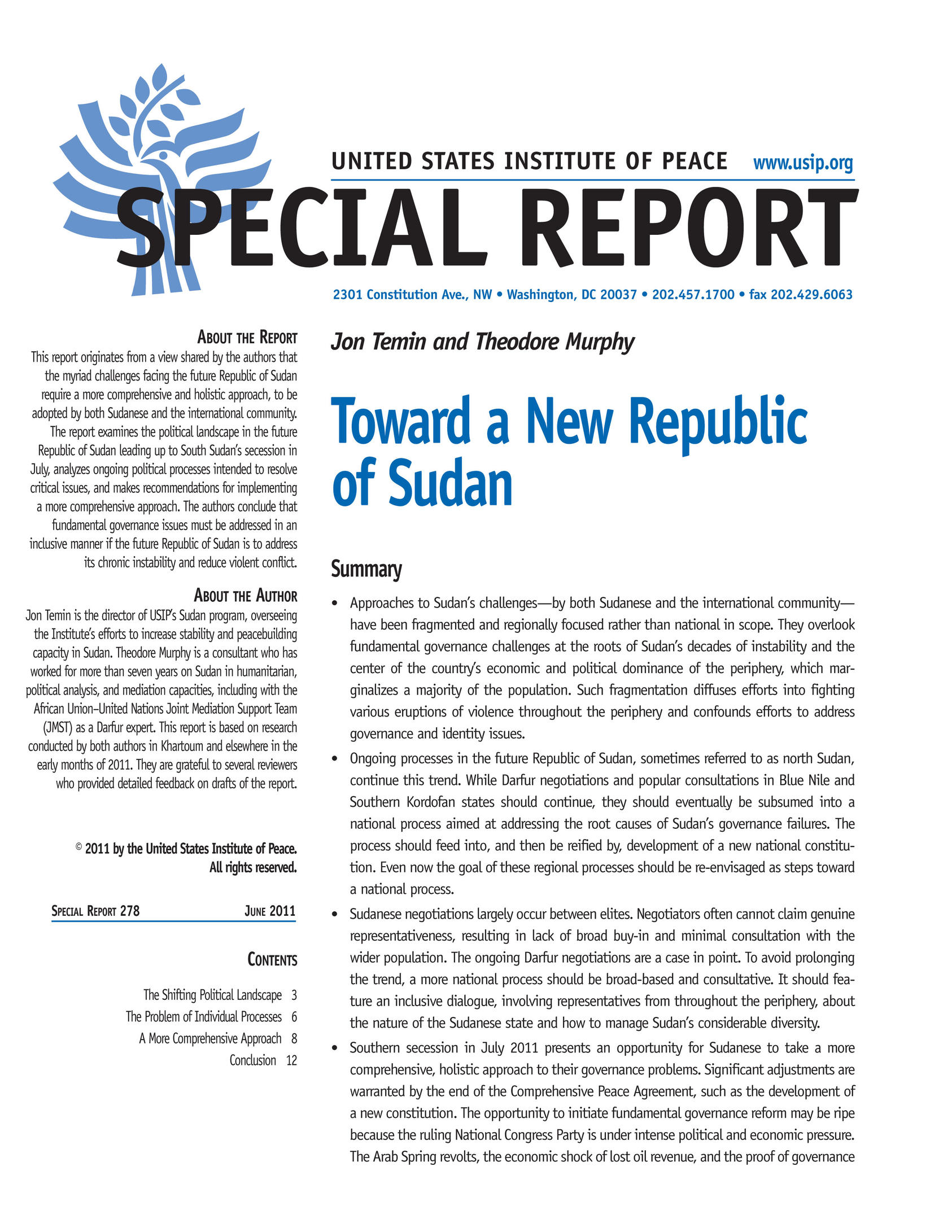Toward a New Republic of Sudan
The exclusionary governance that led South Sudan to secede from the rest of Sudan continues to bedevil the government of the new Republic of Sudan to the north. Both the July secession and the Arab Spring could provide the impetus the ruling party needs to lead national governance reforms and to engage its diverse citizenry in making a new constitution.

Summary
- Approaches to Sudan’s challenges—by both Sudanese and the international community— have been fragmented and regionally focused rather than national in scope. They overlook fundamental governance challenges at the roots of Sudan’s decades of instability and the center of the country’s economic and political dominance of the periphery, which marginalizes a majority of the population. Such fragmentation diffuses efforts into fighting various eruptions of violence throughout the periphery and confounds efforts to address governance and identity issues.
- Ongoing processes in the future Republic of Sudan, sometimes referred to as north Sudan, continue this trend. While Darfur negotiations and popular consultations in Blue Nile and Southern Kordofan states should continue, they should eventually be subsumed into a national process aimed at addressing the root causes of Sudan’s governance failures. The process should feed into, and then be reified by, development of a new national constitution. Even now the goal of these regional processes should be re-envisaged as steps toward a national process.
- Sudanese negotiations largely occur between elites. Negotiators often cannot claim genuine representativeness, resulting in lack of broad buy-in and minimal consultation with the wider population. The ongoing Darfur negotiations are a case in point. To avoid prolonging the trend, a more national process should be broad-based and consultative. It should feature an inclusive dialogue, involving representatives from throughout the periphery, about the nature of the Sudanese state and how to manage Sudan’s considerable diversity.
- Southern secession in July 2011 presents an opportunity for Sudanese to take a more comprehensive, holistic approach to their governance problems. Significant adjustments are warranted by the end of the Comprehensive Peace Agreement, such as the development of a new constitution. The opportunity to initiate fundamental governance reform may be ripe because the ruling National Congress Party is under intense political and economic pressure. The Arab Spring revolts, the economic shock of lost oil revenue, and the proof of governance failure that southern secession represents have inspired, among some NCP leaders, a belief in the necessity of preemptive change.
- Any reform of northern governance should be led by Sudanese. Perceptions that external actors are forcing change can be counterproductive. The international community can support a reform process but should tread carefully. International efforts should focus on promoting an enabling environment in which nascent Sudanese-led efforts can take root and grow. Support to constructive voices and aid to inchoate political initiatives should be available when requested.
- Supporting a national process poses a challenge for the international community as its capacity, pressure, and incentives are already distributed across the various regional political processes. Pressures and incentives are tied to specific benchmarks defined by those processes, making it difficult to reorient them toward the new criteria dictated by a national process.
About the Report
This report originates from a view shared by the authors that the myriad challenges facing the future Republic of Sudan require a more comprehensive and holistic approach, to be adopted by both Sudanese and the international community. The report examines the political landscape in the future Republic of Sudan leading up to South Sudan’s secession in July, analyzes ongoing political processes intended to resolve critical issues, and makes recommendations for implementing a more comprehensive approach. The authors conclude that fundamental governance issues must be addressed in an inclusive manner if the future Republic of Sudan is to address its chronic instability and reduce violent conflict.
About the Author
Jon Temin is the director of USIP’s Sudan program, overseeing the Institute’s efforts to increase stability and peacebuilding capacity in Sudan. Theodore Murphy is a consultant who has worked for more than seven years on Sudan in humanitarian, political analysis, and mediation capacities, including with the African Union–United Nations Joint Mediation Support Team (JMST) as a Darfur expert. This report is based on research conducted by both authors in Khartoum and elsewhere in the early months of 2011. They are grateful to several reviewers who provided detailed feedback on drafts of the report.



